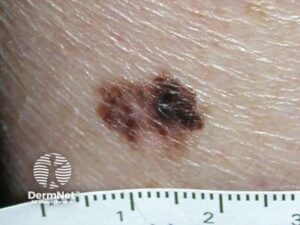
Skin Cancer Screening London: That changing mole might be a problem.
At No. 23 Skin, we believe in skin that should be lived in — freckles, lines, sunspots and all. But living well also means looking after the skin that carries you through it. And that starts with awareness. We’re not looking for perfection but we are looking for the best health outcomes for your skin.
I’ll start by saying that if you’re worried about a mole, please seek medical advice (from us privately, or from your GP in the NHS). Skin cancer is one of the most common cancers in the UK – and one of the most treatable, if caught early. So don’t put it off.
The Mole Check Mindset
Skin cancer screening isn’t about paranoia. It’s about peace of mind.
Our London dermatologists see hundreds of moles every month — both in the NHS and privately — most completely harmless, some not. The truth is, even the most diligent SPF-user can develop new or changing lesions over time. What matters is spotting them early.
Book a mole check if you notice:
-
A mole that’s darker, irregular, or growing
-
A patch of pigment that looks “different” to your others
-
Itching, bleeding, or scabbing that won’t settle
An appointment with an expert can save you worry.
How Skin Cancer Is Diagnosed
When a mole or lesion looks suspicious, your dermatologist will first carry out a clinical assessment — inspecting the area closely, and performing a full skin examination to check for any other concerns.
A dermoscope (a specialised magnifying light) helps identify early skin cancers and differentiate them from benign moles. If something still looks uncertain, your dermatologist will talk this through with you and a skin biopsy may be taken/booked in. A good dermatologist will also be able to advise you on booking back in through the NHS if that’s the right thing to do.
For most non-melanoma skin cancers, a small biopsy can confirm the diagnosis and guide treatment. But if melanoma is suspected, a complete excision is usually recommended. This ensures an accurate diagnosis — as partial biopsies can sometimes miss deeper or more serious changes.
The sample is then examined by a histopathologist in the laboratory. Results usually take a few days, though additional testing can take longer. If there’s any concern the cancer has spread, your dermatologist may arrange further investigations to determine the stage and best treatment plan. All this is explained to you in detail and you are supported every step of the way. It is important to note that most of the skin cancers we see are completely treatable.
(Adapted from NZDermNet: New Zealand Dermatological Society Inc.)

Image reference: https://dermnetnz.org/cme/lesions/melanoma
Early Treatment Saves Lives
The good news? Early skin cancer treatment is usually curative.
Most are treated surgically under local anaesthetic, using one of several techniques:
-
Excision biopsy — removing the mole or lesion entirely
-
Wide local excision — taking a margin of healthy skin around the site
-
Mohs micrographic surgery — removing layers of tissue while examining each under a microscope for precision clearance
For superficial or pre-cancerous lesions, less invasive options may also be used, including:
-
Minor surgical removal, curettage and cautery
-
Cryotherapy (freezing)
-
Topical therapies
-
Photodynamic therapy (using a photosensitising cream plus light)
Your dermatologist will always discuss which route is most appropriate for you, balancing cosmetic outcomes with safety and long-term protection.

Pigmentation: The Other Side of Sun
We’re all for sunshine. (Vitamin D, joy, holidays in the Med — we get it.) But UV exposure, hormones, and even inflammation can leave behind uneven pigmentation that dulls the skin’s natural vitality.
Our dermatologists specialise in distinguishing between harmless pigmentation and damage that needs treatment. From laser therapy to tailored skincare plans, we take a medical-grade approach to restoring clarity without compromising the skin barrier.
Think of it as editing, not erasing — keeping the story your skin tells, but with a clearer page.

Skin Check Expertise Meets Ease
Skin health shouldn’t feel clinical or complicated.
That’s why we’ve built a joined-up dermatology service where your mole check, pigmentation assessment, and any follow-up care happen under one roof. From diagnosis to laser, our consultants and practitioners work seamlessly to ensure your skin gets the right attention at the right time.
Because your wrinkles aren’t the problem.
But that changing mole might be — and checking it could be the healthiest thing you do for yourself this year.
If you would like to speak with us about your skin, or need skin cancer screening in London, we are always on the other end of the phone (chatting about your skin is what we love most). Our number is 02039411815 or email us at hello@23skin.co.uk.
Warmest regards
Helen
Cofoudner
No. 23 Skin
02039411815
Follow us
no23skin